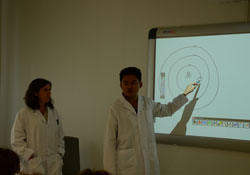WHO supports Turkmenistan in analyzing nutritional composition of foods

WHO/Laura Vremis
Unhealthy diets are becoming an increasingly urgent risk factor for noncommunicable diseases across our region, including countries in central Asia. In particular there is concern regarding the availability of foods high in saturated fats, trans-fatty acids, free sugars and salt, and the government of Turkmenistan has given political priority to addressing excess intake of these nutrients in their National Programme on Healthy Nutrition.
As a result, WHO has offered to provide support to the government of Turkmenistan in order to expand the availability of data on the nutritional composition of foods, with a view to identifying foods that are particularly high in trans-fatty acids and sodium (salt). Strong evidence links trans-fatty acids intake to coronary heart disease, whereas excessive sodium intake can significantly increase blood pressure, which is a major driver of stroke and other cardiovascular diseases.
In October, a team of WHO experts visited Turkmenistan with two objectives:
- to determine the most commonly available ready-to-eat foods and collect representative samples; and
- to support national experts from the National Public Health Center to perform analyses for trans-fatty acids and sodium.
The analyses are able to be conducted in Turkmenistan for the first time, thanks to the recent opening of the National Center for Public Health which has state-of-the-art facilities for chemical food analyses. The training was a success, and a follow-up mission is planned to continue capacity building. A plan for further collaboration in 2017 will be discussed, with WHO providing further support to the implementation of the National Programme on Healthy Nutrition.
WHO will work with Turkmenistan to interpret the findings and develop an appropriate policy response. The results will also link to the FEEDCities project which is coordinated by WHO/Europe and the University of Porto. WHO’s work on food analysis for trans-fatty acids and sodium is financed through a voluntary contribution of the Ministry of Health of the Russian Federation.



